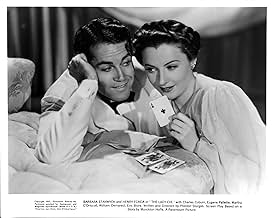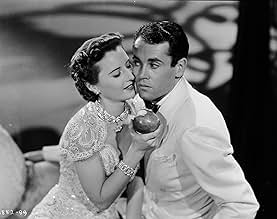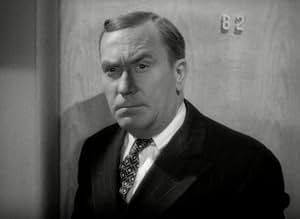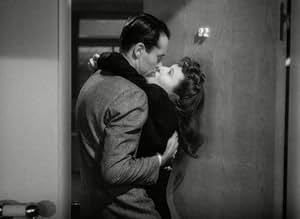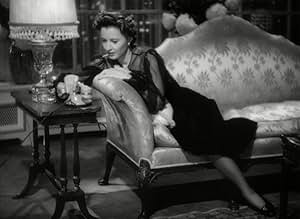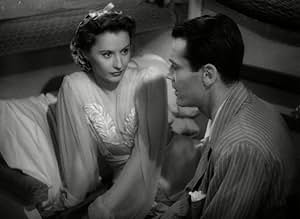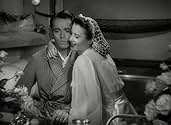AVALIAÇÃO DA IMDb
7,7/10
25 mil
SUA AVALIAÇÃO
Um rico empresário se apaixona por uma golpista, mas termina o relacionamento quando descobre sua verdadeira identidade. Mais tarde, durante um cruzeiro luxuoso, ela se disfarça para tentar ... Ler tudoUm rico empresário se apaixona por uma golpista, mas termina o relacionamento quando descobre sua verdadeira identidade. Mais tarde, durante um cruzeiro luxuoso, ela se disfarça para tentar reconquistá-lo.Um rico empresário se apaixona por uma golpista, mas termina o relacionamento quando descobre sua verdadeira identidade. Mais tarde, durante um cruzeiro luxuoso, ela se disfarça para tentar reconquistá-lo.
- Direção
- Roteiristas
- Artistas
- Indicado a 1 Oscar
- 5 vitórias e 1 indicação no total
Abdullah Abbas
- Man with Potted Palm
- (não creditado)
Norman Ainsley
- Sir Alfred's Servant
- (não creditado)
Mary Akin
- Passenger on Ship
- (não creditado)
Sam Ash
- Husband on Ship
- (não creditado)
Harry A. Bailey
- Lawyer
- (não creditado)
Bobby Barber
- Ship's Waiter with Toupee
- (não creditado)
- Direção
- Roteiristas
- Elenco e equipe completos
- Produção, bilheteria e muito mais no IMDbPro
Avaliações em destaque
I don't know how I missed seeing this until now, but tonight I watched THE LADY EVE unfurl on TCM and took notice of how great the chemistry was between BARBARA STANWYCK and HENRY FONDA. And even more so, how fantastic their ability with screwball comedy had to be in order to make their characters as believable as they are.
Fonda, especially, impressed me with his honestly naive interpretation of a man without guile. He seemed totally hoodwinked by Stanwyck's con artist, even in those relentless close-ups that captured every expression on his Honest Abe face. Stanwyck, of course, had a role tailored to her abilities and was at the top of her form as an actress.
I would have liked a better role for Melville Cooper who is somewhat wasted in his rather thankless supporting role but Charles Coburn, William Demarest and Eric Blore have no such trouble with full-bodied character parts.
Sturgess obviously is a master of long takes--and proves it again in his seduction scene where Stanwyck toys with Fonda's hair as she drapes herself across him, a spider spinning her web. Her best moment is the scene in the dining room where she uses her make-up mirror to make a running commentary on all the women who are ogling the rich catch (Fonda) while he becomes aware of the female attention. Although Fonda's pratfalls are painfully real, Sturges lets them occur a little too frequently. Demarest too has his share of falls--as he did in that other Sturges masterpiece, THE MIRACLE OF MORGAN'S CREEK.
Fonda's performance ranks with his mild professor in THE MALE ANIMAL. As for Stanwyck, her professionalism has never been more solid. She was nominated in 1941 for Best Actress in BALL OF FIRE but she is equally impressive in her dual role assignment here.
Fonda, especially, impressed me with his honestly naive interpretation of a man without guile. He seemed totally hoodwinked by Stanwyck's con artist, even in those relentless close-ups that captured every expression on his Honest Abe face. Stanwyck, of course, had a role tailored to her abilities and was at the top of her form as an actress.
I would have liked a better role for Melville Cooper who is somewhat wasted in his rather thankless supporting role but Charles Coburn, William Demarest and Eric Blore have no such trouble with full-bodied character parts.
Sturgess obviously is a master of long takes--and proves it again in his seduction scene where Stanwyck toys with Fonda's hair as she drapes herself across him, a spider spinning her web. Her best moment is the scene in the dining room where she uses her make-up mirror to make a running commentary on all the women who are ogling the rich catch (Fonda) while he becomes aware of the female attention. Although Fonda's pratfalls are painfully real, Sturges lets them occur a little too frequently. Demarest too has his share of falls--as he did in that other Sturges masterpiece, THE MIRACLE OF MORGAN'S CREEK.
Fonda's performance ranks with his mild professor in THE MALE ANIMAL. As for Stanwyck, her professionalism has never been more solid. She was nominated in 1941 for Best Actress in BALL OF FIRE but she is equally impressive in her dual role assignment here.
OK so the plot of The Lady Eve doesn't make a lot of sense, but why should it? It's fast, funny, and offers two great stars--Barbara Stanwyck and Henry Fonda--great roles. Although both stars were better known for their dramatic roles, Fonda and Stanwyck breeze thru this romp in classic style.
Fonda plays a rich goofus who falls for Jean (Stanwyck) onboard an ocean liner but she turns out to be a crook so he dumps her. To get even, she pretends to be the British Lady Eve and crashes his Connecticut manor. He falls for her again.
Surprisingly racy lines for a 1941 comedy and a totally wonderful supporting cast make this a must see. Charles Coburn plays Stanwyck's father. Eugene Palette and Janet Beecher are Fonda's parents. William Demarest is the valet. Eric Blore is the faux earl. Melville Cooper is Coburn's valet. Robert Greig is the butler. Torben Meyer is the purser, and Martha O'Driscoll is a maid. The film is full of other faces familiar from Preston Sturges comedies: Jimmy Conlin, Al Bridge, Julius Tannen, Robert Warwick, and Robert Dudley. Also look for Bess Flowers, Barbara Pepper, and Luis Alberni.
First and foremost, however, are Stanwyck and Fonda. They made 3 films together and they are perfect Sturges types. He is still and gawky but basically good. She is slightly bad and sexy but basically good. It would be easy to replace Fonda in this film with another Sturges favorite, Joel McCrea, or replace Stanwyck with Veronica Lake (the star's of his Sullivan's Travels) and this would have been a good film. But Fonda and Stanwyck make this edgier than Lake and McCrea could have made it. Indeed if Fonda had been the star of Sullivan's Travels, that film would be in the top ten on all film fans' lists.
But The Lady Eve is just terrific. It's a comedy that runs hot on pacing, great lines, and the charisma and chemistry of two major stars. How odd that this classic comedy received only one Oscar nomination--for writing. Preston Sturges would be nominated for writing 3 times and win for The Great McGinty. He was never nominated as a director. The Lady Eve, Sullivan's Travels, The Palm Beach Story, Miracle of Morgan's Creek, and Hail the Conquering Hero remain cornerstones of 40s comedy.
The Lady Eve is a must see for fans of great comedy and the likes of Sturges, Stanwyck, and Fonda!
Fonda plays a rich goofus who falls for Jean (Stanwyck) onboard an ocean liner but she turns out to be a crook so he dumps her. To get even, she pretends to be the British Lady Eve and crashes his Connecticut manor. He falls for her again.
Surprisingly racy lines for a 1941 comedy and a totally wonderful supporting cast make this a must see. Charles Coburn plays Stanwyck's father. Eugene Palette and Janet Beecher are Fonda's parents. William Demarest is the valet. Eric Blore is the faux earl. Melville Cooper is Coburn's valet. Robert Greig is the butler. Torben Meyer is the purser, and Martha O'Driscoll is a maid. The film is full of other faces familiar from Preston Sturges comedies: Jimmy Conlin, Al Bridge, Julius Tannen, Robert Warwick, and Robert Dudley. Also look for Bess Flowers, Barbara Pepper, and Luis Alberni.
First and foremost, however, are Stanwyck and Fonda. They made 3 films together and they are perfect Sturges types. He is still and gawky but basically good. She is slightly bad and sexy but basically good. It would be easy to replace Fonda in this film with another Sturges favorite, Joel McCrea, or replace Stanwyck with Veronica Lake (the star's of his Sullivan's Travels) and this would have been a good film. But Fonda and Stanwyck make this edgier than Lake and McCrea could have made it. Indeed if Fonda had been the star of Sullivan's Travels, that film would be in the top ten on all film fans' lists.
But The Lady Eve is just terrific. It's a comedy that runs hot on pacing, great lines, and the charisma and chemistry of two major stars. How odd that this classic comedy received only one Oscar nomination--for writing. Preston Sturges would be nominated for writing 3 times and win for The Great McGinty. He was never nominated as a director. The Lady Eve, Sullivan's Travels, The Palm Beach Story, Miracle of Morgan's Creek, and Hail the Conquering Hero remain cornerstones of 40s comedy.
The Lady Eve is a must see for fans of great comedy and the likes of Sturges, Stanwyck, and Fonda!
On the surface of it, THE LADY EVE is a delightfully shallow evening's entertainment. It's a clever little film, filled with great dialogue ("Don't be vulgar, Jean. Let us be crooked, but never common.") and eccentric characters, from the leading lady Jean (a marvellous Barbara Stanwyck) and her much-beleaguered main man Charlie Pike (Henry Fonda) down to the other con artists that make up Jean's circle, including her dad Harry (Charles Coburn), sidekick Gerald (Melville Cooper) and Sir Alfred McGlennan Keith (Eric Blore)... or just Pearlie for short. Charlie is heir to the Pike Ale fortune, and while on a cruise home from South America, Harrington father and daughter decide to take the hapless lad to the metaphorical drycleaners. What neither of them gambles on is a romance that was always in the cards for Jean and Charlie. But just as Jean is about to go 'straight' for Charlie, he discovers that his girlfriend is part of a con racket, and unceremoniously dumps her. Hurt and determined to get revenge for his cruel parting words, Jean initiates a farce as the Lady Eve Sidwich of the film's title and infiltrates Charlie's home and heart again. She quickly teaches him a lesson he'll never forget, just as she realises how much she really still loves Charlie.
Story-wise, then, it's no doubt that THE LADY EVE provides fine frothy entertainment. Pair that with the surreal touches added into the film by Preston Sturges (take for example the supposedly climactic scene in which Charlie repeats his words of love to Eve--Fonda never gets to play the scene straight, even though he has to maintain a stony face as his horse keeps butting into his speech... presumably to try to get him to stop talking!), and there's certainly plenty to keep one occupied as is. The film is, of course, a screwball comedy absolutely bent on throwing every possible obstacle it can into the path of its intended couple, coming up with more twists than you expect...
However, thanks largely to the brilliant writing and direction provided by Sturges, it actually also plays very close and very insightfully to the theme of what Stanley Cavell calls 'remarriage comedy'. The idea behind this is that legal or religious marriages, the 'first' marriages of the couple concerned in such comedies, are actually sham marriages. It isn't saying 'I do' or signing a piece of paper that makes a marriage a marriage; it's the behaviour of the couple, their own endorsement, that makes it a true marriage. This theme is reflected in, for example, THE AWFUL TRUTH, which sees Lucy and Jerry Warriner divorcing (their first, sham marriage didn't work out) but getting back together again for a true, albeit not yet legalised, union. The same theme pervades THE PHILADELPHIA STORY. Preston Sturges very skilfully and effectively--but subtly!--brings this theme to his film as well. Eve and Charlie are married, but it is only when Charlie asks Jean for forgiveness and vice versa is it possible for the fact that they are married (to each other, as poor Charlie does not know!) to become significant and actually positively affirmed.
This isn't the only interesting point the film makes while appearing to be little more than a fluffy piece of entertainment--when Charlie breaks Jean's heart, she tells him, "The best [girls] aren't as good as you think they are and the bad ones aren't as bad. Not nearly as bad." She sets out to prove this, both in her fabricated 'good-girl' persona as Eve (later revealed to have had many MANY suitors) and her real 'bad-girl' con-artist self Jean (who has a soft heart and a love for Charlie that proves to be one of her virtues). Practically everyone in the film has (at least) two names by which they're known: Jean/Eve, Charlie/Hopsie, Muggsy/Murgatroyd/Ambrose, Harry/Colonel Harrington, Pearlie/Sir Alfred and so on. This suggests, quite rightly, that people are complicated complex beings, and that appearances often have nothing to do with reality. It also brings the film's story to a head--Jean and Charlie can never be happy together until Charlie can accept Jean as she is, and this he presumably will have learnt through his short, disastrous 'marriage' to Eve.
Stanwyck and Fonda are really outstanding in this film. Stanwyck's job is to persuasively depict two characters, and then effect a blend of the two of them in the final minutes of the story, and she pulls off both the sassy, confident Jean and the elegant, British Eve perfectly. It's not hard to imagine Charlie falling hard for Jean, even with her hard-headed casing of the joint and her prospective competition (appropriately deemed second-rate) for his affections... a very memorable scene involving her make-up mirror and a narrative voice-over, the latter of which is used to great effect in the lead-up to the 'romantic scene and horse' bit which follows later in the film. Fonda has the apparently easier job of appearing mostly colourless and stodgy as he spends most of his screen time reacting to situations created by both Jean and Eve, but I contend that it must really take quite a lot of true acting ability to execute the pratfalls that he does without making Charlie such a wimp that you can't imagine Jean still wanting him at the very end. Though not quite as effective as Cary Grant, who has to do the same thing in the face of Katharine Hepburn's breathlessly effusive Susan Vance in BRINGING UP BABY, Fonda still brings a sweet charm to his role as the not-at-all-slick, often befuddled Charlie Pike. Add these two classy performances to that given by the able supporting cast, and THE LADY EVE is not just well-scripted and directed, but also very very well-acted indeed.
So, watch this film the first time just for fun--be charmed by the characters, by the dialogue, by the actors, by everything. Then watch it again to realise just how subtly and effectively THE LADY EVE actually makes several comments on marriage and on love. I highly recommend getting your hands on the Criterion Collection DVD, which has (aside from a tremendous photo gallery and interview with Peter Bogdanavich and other special features) a fantastic, thought-provoking commentary by film critic Marian Keane--it most certainly got *me* thinking!
Great film, great entertainment, great message!
Story-wise, then, it's no doubt that THE LADY EVE provides fine frothy entertainment. Pair that with the surreal touches added into the film by Preston Sturges (take for example the supposedly climactic scene in which Charlie repeats his words of love to Eve--Fonda never gets to play the scene straight, even though he has to maintain a stony face as his horse keeps butting into his speech... presumably to try to get him to stop talking!), and there's certainly plenty to keep one occupied as is. The film is, of course, a screwball comedy absolutely bent on throwing every possible obstacle it can into the path of its intended couple, coming up with more twists than you expect...
However, thanks largely to the brilliant writing and direction provided by Sturges, it actually also plays very close and very insightfully to the theme of what Stanley Cavell calls 'remarriage comedy'. The idea behind this is that legal or religious marriages, the 'first' marriages of the couple concerned in such comedies, are actually sham marriages. It isn't saying 'I do' or signing a piece of paper that makes a marriage a marriage; it's the behaviour of the couple, their own endorsement, that makes it a true marriage. This theme is reflected in, for example, THE AWFUL TRUTH, which sees Lucy and Jerry Warriner divorcing (their first, sham marriage didn't work out) but getting back together again for a true, albeit not yet legalised, union. The same theme pervades THE PHILADELPHIA STORY. Preston Sturges very skilfully and effectively--but subtly!--brings this theme to his film as well. Eve and Charlie are married, but it is only when Charlie asks Jean for forgiveness and vice versa is it possible for the fact that they are married (to each other, as poor Charlie does not know!) to become significant and actually positively affirmed.
This isn't the only interesting point the film makes while appearing to be little more than a fluffy piece of entertainment--when Charlie breaks Jean's heart, she tells him, "The best [girls] aren't as good as you think they are and the bad ones aren't as bad. Not nearly as bad." She sets out to prove this, both in her fabricated 'good-girl' persona as Eve (later revealed to have had many MANY suitors) and her real 'bad-girl' con-artist self Jean (who has a soft heart and a love for Charlie that proves to be one of her virtues). Practically everyone in the film has (at least) two names by which they're known: Jean/Eve, Charlie/Hopsie, Muggsy/Murgatroyd/Ambrose, Harry/Colonel Harrington, Pearlie/Sir Alfred and so on. This suggests, quite rightly, that people are complicated complex beings, and that appearances often have nothing to do with reality. It also brings the film's story to a head--Jean and Charlie can never be happy together until Charlie can accept Jean as she is, and this he presumably will have learnt through his short, disastrous 'marriage' to Eve.
Stanwyck and Fonda are really outstanding in this film. Stanwyck's job is to persuasively depict two characters, and then effect a blend of the two of them in the final minutes of the story, and she pulls off both the sassy, confident Jean and the elegant, British Eve perfectly. It's not hard to imagine Charlie falling hard for Jean, even with her hard-headed casing of the joint and her prospective competition (appropriately deemed second-rate) for his affections... a very memorable scene involving her make-up mirror and a narrative voice-over, the latter of which is used to great effect in the lead-up to the 'romantic scene and horse' bit which follows later in the film. Fonda has the apparently easier job of appearing mostly colourless and stodgy as he spends most of his screen time reacting to situations created by both Jean and Eve, but I contend that it must really take quite a lot of true acting ability to execute the pratfalls that he does without making Charlie such a wimp that you can't imagine Jean still wanting him at the very end. Though not quite as effective as Cary Grant, who has to do the same thing in the face of Katharine Hepburn's breathlessly effusive Susan Vance in BRINGING UP BABY, Fonda still brings a sweet charm to his role as the not-at-all-slick, often befuddled Charlie Pike. Add these two classy performances to that given by the able supporting cast, and THE LADY EVE is not just well-scripted and directed, but also very very well-acted indeed.
So, watch this film the first time just for fun--be charmed by the characters, by the dialogue, by the actors, by everything. Then watch it again to realise just how subtly and effectively THE LADY EVE actually makes several comments on marriage and on love. I highly recommend getting your hands on the Criterion Collection DVD, which has (aside from a tremendous photo gallery and interview with Peter Bogdanavich and other special features) a fantastic, thought-provoking commentary by film critic Marian Keane--it most certainly got *me* thinking!
Great film, great entertainment, great message!
The Lady Eve is one of the most memorable comedies of the golden age, and today it stands as a highly entertaining movie that has a lot of enjoyably dated comedy. Particularly hilarious are the scenes in which Stanwyck spills her life story to Fonda as they swoosh under the train tunnel, and the scenes in which the food trays keep spilling on Fonda. The performances are great, and though it seems more like Stanwyck falls for Fonda out of pity more than love, the two work well together. And Barbara Stanwyck in that black, bare-midriff dress is one of the most breath-takingly beautiful images ever to appear on the screen.
In this period of Henry Fonda's career, most of the good films was stuff he made away from his studio at 20th Century Fox. The Lady Eve is one of the best examples of that,
With the success that Preston Sturges had with Christmas in July and The Great McGinty the year before, Paramount decided now they could trust Sturges with a big budget and an A list pair of leads. In fact they borrowed Henry Fonda from Darryl Zanuck and signed the then freelancing Barbara Stanwyck.
This was a banner year in the career of Barbara Stanwyck. She did Meet John Doe, The Lady Eve and Ball of Fire in the same year, the last one she got an Oscar nomination for Best Actress. The Lady Eve came first and paved the way for a similar role in Ball of Fire.
She's a street smart dame in both films, in the Lady Eve she's a shill for her conman father Charles Coburn and in Ball of Fire she's a nightclub singer and moll for gangster Dana Andrews. In both films she falls for rather withdrawn, naive, and bookish sort of men who bring out the mother instinct in her. In fact she has similar nicknames for them, Gary Cooper is called Pottsie and Henry Fonda is Hopsie.
Stanwyck, Coburn, and Melville Cooper are a trio of con artists who are looking for a fresh pigeon and they find one in Henry Fonda who is a millionaire's kid. Fonda today would be called a trust fund baby, but he has an interest in science and he's coming back from the Amazon on a boat when meets up with the slick trio.
Of course Stanwyck falls for the shy and bumbling Fonda, but there are many hurdles to overcome before these two find happiness.
This may have been Henry Fonda's best comedy part. And like Joel McCrea in other Preston Sturges films, Fonda does so well in the part because he plays it absolutely straight. No tongue in cheek, no winks at the audience, Fonda plays it straight and sincere.
The usual Preston Sturges stock company is here and prominent in the cast is always William Demarest as the mug that is a kind of bodyguard factotum for Fonda. Hired of course by Eugene Palette in another one of his crotchety millionaire father roles.
Best scene in the film is right at the beginning as Stanwyck analyzes all the moves a lot of the other females on board are using to attract Fonda before she decides on a very direct approach.
The Lady Eve holds up very well as do all of Preston Sturges's work after over 60 years. I do kind of wonder though if Stanwyck can control that streak of larceny in her even though she's marrying a millionaire who can give her anything.
With the success that Preston Sturges had with Christmas in July and The Great McGinty the year before, Paramount decided now they could trust Sturges with a big budget and an A list pair of leads. In fact they borrowed Henry Fonda from Darryl Zanuck and signed the then freelancing Barbara Stanwyck.
This was a banner year in the career of Barbara Stanwyck. She did Meet John Doe, The Lady Eve and Ball of Fire in the same year, the last one she got an Oscar nomination for Best Actress. The Lady Eve came first and paved the way for a similar role in Ball of Fire.
She's a street smart dame in both films, in the Lady Eve she's a shill for her conman father Charles Coburn and in Ball of Fire she's a nightclub singer and moll for gangster Dana Andrews. In both films she falls for rather withdrawn, naive, and bookish sort of men who bring out the mother instinct in her. In fact she has similar nicknames for them, Gary Cooper is called Pottsie and Henry Fonda is Hopsie.
Stanwyck, Coburn, and Melville Cooper are a trio of con artists who are looking for a fresh pigeon and they find one in Henry Fonda who is a millionaire's kid. Fonda today would be called a trust fund baby, but he has an interest in science and he's coming back from the Amazon on a boat when meets up with the slick trio.
Of course Stanwyck falls for the shy and bumbling Fonda, but there are many hurdles to overcome before these two find happiness.
This may have been Henry Fonda's best comedy part. And like Joel McCrea in other Preston Sturges films, Fonda does so well in the part because he plays it absolutely straight. No tongue in cheek, no winks at the audience, Fonda plays it straight and sincere.
The usual Preston Sturges stock company is here and prominent in the cast is always William Demarest as the mug that is a kind of bodyguard factotum for Fonda. Hired of course by Eugene Palette in another one of his crotchety millionaire father roles.
Best scene in the film is right at the beginning as Stanwyck analyzes all the moves a lot of the other females on board are using to attract Fonda before she decides on a very direct approach.
The Lady Eve holds up very well as do all of Preston Sturges's work after over 60 years. I do kind of wonder though if Stanwyck can control that streak of larceny in her even though she's marrying a millionaire who can give her anything.
Você sabia?
- CuriosidadesIt was hibernation season during the shoot, and Emma the king snake was always sleeping while also shedding her skin. Needless to say, she was very uncooperative.
- Erros de gravaçãoWhen Charles first meets "the Lady Eve Sidwich" at the party, his face goes from blank expression to shock twice - first with all characters, then in closeup.
- Cenas durante ou pós-créditosA very large cartoon snake displays the opening credits while twining around an apple tree.
- ConexõesEdited into Spisok korabley (2008)
Principais escolhas
Faça login para avaliar e ver a lista de recomendações personalizadas
Detalhes
- Data de lançamento
- País de origem
- Idioma
- Também conhecido como
- As 3 Noites de Eva
- Locações de filme
- Empresa de produção
- Consulte mais créditos da empresa na IMDbPro
Bilheteria
- Faturamento bruto mundial
- US$ 15.142
- Tempo de duração1 hora 34 minutos
- Cor
- Proporção
- 1.37 : 1
Contribua para esta página
Sugerir uma alteração ou adicionar conteúdo ausente

Principal brecha
By what name was As Três Noites de Eva (1941) officially released in India in English?
Responda

